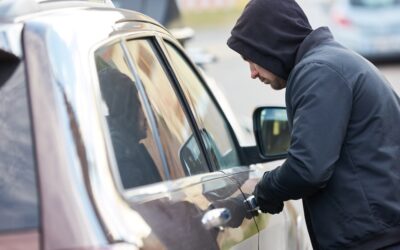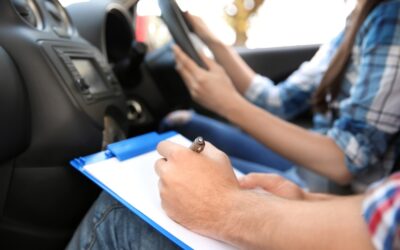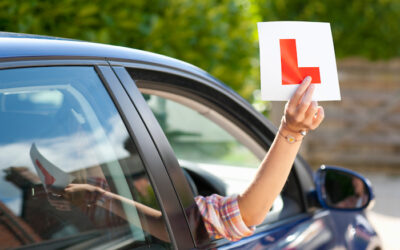You might get this question on your theory test:
When may you drive without wearing your seatbelt?
- When you’re making a journey of less than 1 mile
- When you’re starting off uphill
- During a manoeuvre that involves reversing
- When you’re in slow queuing traffic
Do you know the answer to this one?
It’s C – you may drive without a seatbelt when you’re reversing.
It’s still a good idea to wear a seatbelt while reversing, but it’s not a legal requirement to do so. This is presumably because seatbelts will save your life if you’re involved in an accident at high speeds while moving forward. But when reversing, not only are you travelling backwards, you’ll also be travelling very slowly. If you collide with another car, you won’t need a seatbelt to prevent you from flying through the windscreen, or banging your head on the steering wheel. For some people, the seatbelt may also restrict their ability to turn fully to see out of their back windscreen, another reason for the relaxation of the rules.
Alternatively, you might get this question:
When may you drive without wearing your seatbelt?
- When the speed limit is 30mph or less
- If the seatbelt is too large for you to use
- When you’re driving on a motorway
- When you hold a medical exemption certificate
In this case, the answer’s a bit more obvious. It’s D – you may drive without a seatbelt when you hold a medical exemption certificate.
Seatbelt Law
UK law says that, if the seat you’re using has a seatbelt, then you must use it. If you don’t, you can get a fine of up to £500.
When it comes to children, it’s the driver’s responsibility to ensure that:
- Any children younger than 12, or under 135cm tall, use the correct car seat for their height and weight. Read our full guide to child car seat rules here.
- Any child 12 or 13 years old, or younger and over 135cm tall, wears a seatbelt. You can read our full guide to when children can stop using car seats here.
When May You Drive Without Wearing a Seatbelt?
As we’ve found by looking at the theory test questions, you don’t need to wear a seatbelt when you’re reversing, and if you have a medical exemption. If you do have a medical exemption, you must keep your exemption certificate in your vehicle, so that you can show it to the police if they stop you.
There are other situations when it’s not a legal requirement to wear a seatbelt:
- If you’re in a vehicle that’s being used for police, fire and rescue services.
- When you’re driving a goods vehicle on deliveries, and you’re travelling 50 metres or less between stops.
- When you’re a licensed taxi driver and you’re carrying passengers, or “plying for hire.”
Do I Have to Wear a Seatbelt If I’m Pregnant?
Yes, you must still wear a seatbelt if you’re pregnant. If your seatbelt’s causing you considerable discomfort, talk to your doctor. If necessary, they can give you a medical exemption certificate. And as we said above, you should then keep this in your car at all times, so you can show it to the police if need be.
But unless you have a medical exemption, you must wear a seatbelt while pregnant.
What If I’m In a Vehicle With No Seatbelts?
Some classic cars don’t have seatbelts. Remember, UK law states that if the seat you’re using has a seatbelt, then you must use it. So if your seat has no seatbelt, then this law doesn’t apply. However, if you drive a car with no seatbelts, then it’s illegal to carry any children under 3 years old in it. This is because, with no seatbelts, you’ll have no means of securing their car seats.
Furthermore, any children over 3 must sit in the backseat.
Bear in mind that these rules only apply if the vehicle was originally made without seatbelts. You can’t remove seatbelts from a car during renovation, for example.
Do Animals Need a Seatbelt in the Car?
If you’re carrying a small animal in the car, such as a cat or a guinea pig, then you should transport them in an appropriate pet carrier. For a bigger animal, like a dog, there’s specific guidance from the Highway Code.
It states that: “When in a vehicle, make sure dogs or other animals are suitably restrained so they cannot distract you while you are driving or injure you, or themselves, if you stop quickly. A seatbelt harness, pet carrier, dog cage or dog guard are ways of restraining animals in cars.”
You can read our full guide to restraining dogs and other animals in cars.
Busy Studying for Your Driving Theory Test?
There are many apps out there that’ll help you learn everything you need to know. Head here to read our guide to the 10 best driving theory test apps.
It’s also a great idea to practice driving outside your lessons. As well as helping you to build up your confidence, this will enable you to learn the rules of the road in “real world” conditions. So it’ll help you prepare for both your theory and your practical test.
You will have to sort out your own car insurance for any driving you do outside of lessons. Head here to read our full guide to learner driver insurance.
If you take out your learner driver insurance with Go Girl, we’ll let you build up your No Claims Discount as soon as you start to drive. This will help you make huge savings on the cost of your car insurance in the long-term. Head here to learn more about our learner driver insurance, and get in touch to get a free quote online in seconds.




